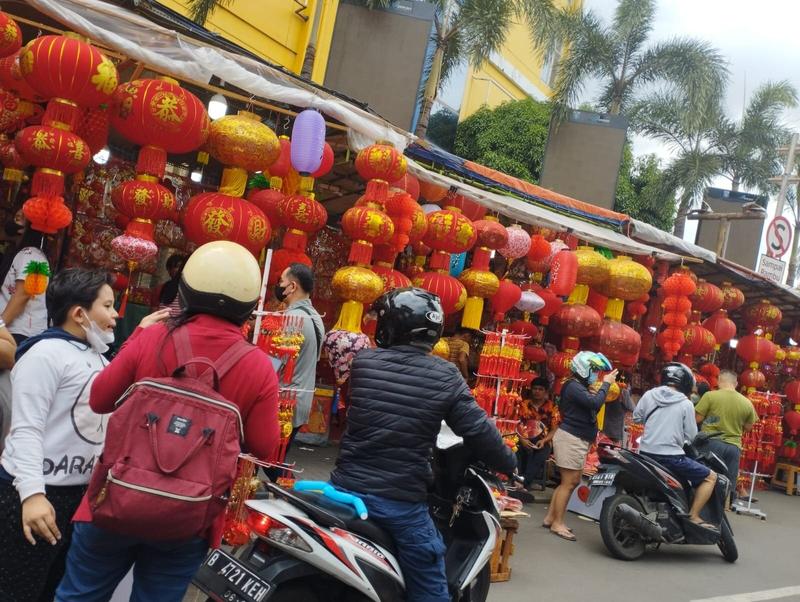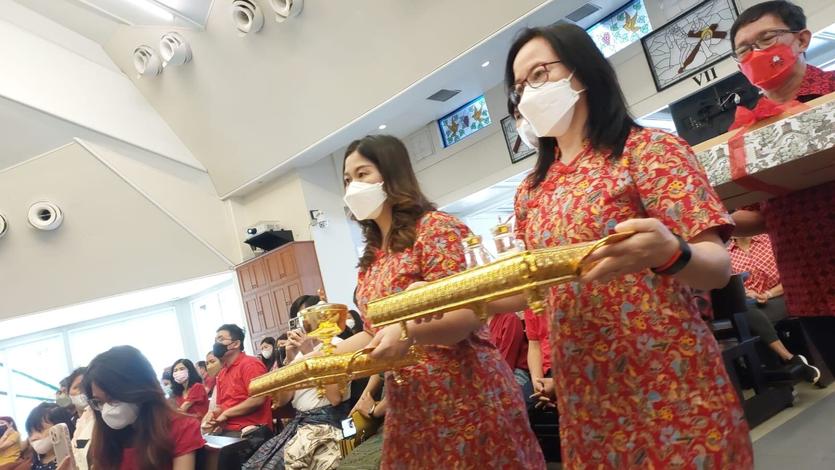 In this undated photo, traditional Chinese Lanterns line up streets at Chinatown of Jakarta during the Imlek, a public holiday in Indonesia for Chinese New Year. (LEONARDUS JEGHO / FOR CHINA DAILY)
In this undated photo, traditional Chinese Lanterns line up streets at Chinatown of Jakarta during the Imlek, a public holiday in Indonesia for Chinese New Year. (LEONARDUS JEGHO / FOR CHINA DAILY)
Indonesia welcomed the return of stylish Chinese New Year festivities after three years of quiet celebration at the height of the pandemic, with president’s greetings, traditional lion and dragon dances and lanterns among others.
Glodok, known as Jakarta’s Chinatown, was especially busy with Indonesians flocking to the area to buy lanterns, new clothes, incense and fruit baskets. Chinese Indonesians held family reunions and gave angpao (red packets filled with money) to family and friends.
Indonesian President Joko Widodo sent his greetings to the ethnic Chinese community. In his social media account, Widodo wrote: “Times changed, years passed, and challenges may change. But, one thing that should always stay is hope that tomorrow will be a happier, more prosperous and more developed time.”
Chinese New Year, known locally as Imlek, is among the major festivals in the multi-ethnic Southeast Asian nation. The ethnic Chinese community accounts for roughly five percent of Indonesia’s of 273 million population. Since the first day of the Chinese New Year fell on Jan 22 on a Sunday, Jan 23 was declared as public holiday in Indonesia.
Siang Hadi Widjaja, a Jakarta-based businessman, welcomed the return of a more “upbeat” Chinese New Year celebrations. He said this is good for the economy as Imlek festivities have boosted demand for food, souvenirs and home decorations. Performances like the barongsai (lion dance) parade can also attract tourists.
“So economically, Imlek helps lots of people,” Widjaja said.
At Jakarta’s Borobudur Intercontinental Hotel, lion dance and an orchestra that showcases Chinese string instrument guzheng were held over the weekend. Likewise, members of the Indonesian Kong Hu Cu Society held a ritual at Taman Mini Indonesia Indah. Visitors, many of whom came from outside Jakarta, were there to watch the ceremony
At Jakarta’s Borobudur Intercontinental Hotel, lion dance and an orchestra that showcases Chinese string instrument guzheng were held over the weekend. Likewise, members of the Indonesian Kong Hu Cu Society held a ritual at Taman Mini Indonesia Indah. Visitors, many of whom came from outside Jakarta, were there to watch the ceremony.
In the city of Merauke in the eastern Indonesia’s province of Papua, a barongsai troupe paraded around the city and has drawn a huge crowd. The ethnic Chinese community are proud of the harmonious life in Merauke while leaders of indigenous groups in Papua said Chinese cultural arts are part of their daily lives. Most performers in the barongsai troupe are indigenous Papuans.
ALSO READ: New Arab allies face quandary as Israel shifts hard-right
Church services were held across the country, with the homily delivered in Mandarin and the Holy Mass concluded with the distribution of oranges among the churchgoers.
Noviana Tjokrowiredjo, secretary of the Association of Chinese Language Teachers for Banten Province in western Java, said that she’s happy that Imlek celebrations is widely celebrated in Indonesia.
“I am happy. We feel even stronger that we, Chinese, feel that as Indonesians we have a place here in this country,” Tjokrowiredjo said. She cited Indonesia’s national motto “Bhineka Tunggal Ika” (In Diversity We are One) and how is this not an empty slogan but a reality in Indonesia.
 In this undated photo, local performances are again held in Jakarta for Imlek and exchanges of Spring Festival greetings. (LEONARDUS JEGHO / FOR CHINA DAILY)
In this undated photo, local performances are again held in Jakarta for Imlek and exchanges of Spring Festival greetings. (LEONARDUS JEGHO / FOR CHINA DAILY)
Celebrating the Imlek is significant for the Chinese-Indonesian community as they can still remember the time when public celebrations of Imlek had been banned for long. Suharto, who ruled Indonesia for 30 years, also banned Chinese-language schools and the teaching of Chinese language. Ethnic Chinese were required to change their names and adopt Indonesian names.
After Suharto’s fall in 1998, Indonesians embraced a new era for ethnic harmony and people of Chinese origin. Chinese schools were reopened and they can finally celebrate Imlek.
Tedy Yusuf, a retired army officer and former member of the parliament, established the Indonesian-Chinese Social Association to serve as a platform for the Chinese-Indonesian community to campaign against discrimination of ethnic Chinese.
Such campaign has led to the drafting and enforcement of laws that allow ethnic Chinese to hold senior government positions like becoming president and vice president; have Imlek declared a national holiday; and allow the establishment of Chinese schools and cultural centers.
“I feel that the situation is getting better (for the Chinese-Indonesian community),” Yusuf said.
READ MORE: Modi’s BJP scores big win in Gujarat
Tjokrowiredjo said that there is also a rising demand for Chinese language teachers in Indonesia as more companies are looking for workers with adequate Chinese language skills.
“As China is now one of the biggest countries economically, demand for people with Chinese language skills are continuing to increase globally,” she said.
Tjokrowiredjo said that before the pandemic, the Association of Chinese Language Teachers sends 10 students each year to study in China. After their graduation, these students return to Indonesia to teach Chinese language in local schools.
Indonesian businessman Widjaja also sees stronger economic cooperation between China and Indonesia as China is a major export market and one of the biggest investors in Indonesia.
Leonardus Jegho is a freelance journalist for China Daily.
Contact the writers at prime@chinadailyapac.com


